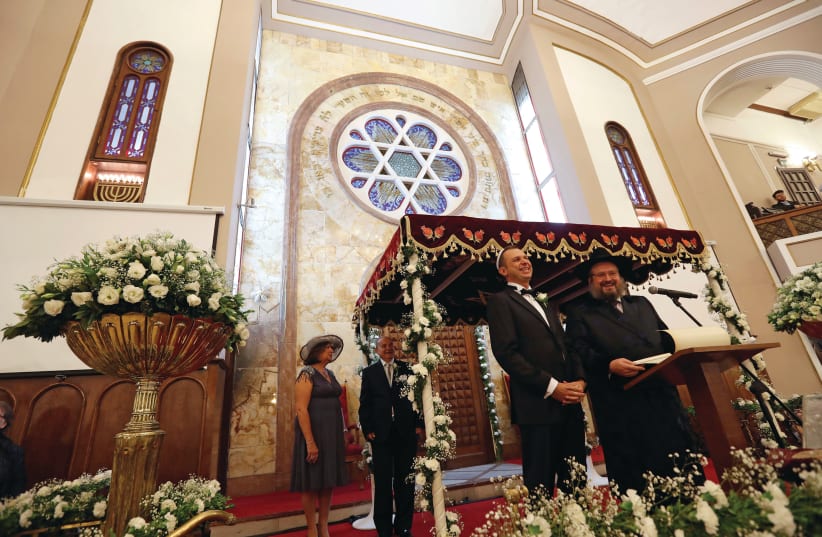I am often asked if there are still Jews living in Istanbul when introducing myself as a rabbi in Turkey’s thriving Jewish community. Too often, people assume these communities are a thing of the past, when in fact, they are very much part of the present and are increasingly hopeful about their future.
Jews have lived in Islamic countries for thousands of years. Perhaps the best-known example is Maimonides – one of our greatest sages – who was raised in Almoravid Cordoba before settling in Fatimid Caliphate-controlled Egypt. Countless Jewish communities flourished in the past eras of peace and prosperity under Islamic rule, many Jews have found refuge from Christian prosecution in Muslim lands. And once again today peace, tolerance and prosperity are on the rise for Jews in many Islamic countries.
These past few weeks, during the Festival of Purim, notwithstanding the impact of the pandemic, thousands of Jews across the Muslim world took part in Purim festivities, and thousands of food packages – Seders-in-a-box – are being prepared by communities in advance of Passover.
To ensure the future for the many thousands of Jews in our communities living in Muslim-majority countries, we need to focus on the presently increasing religious freedoms we are experiencing as we build toward an even more sustainable future, rather than focusing on the mire of the past. That is not to say we should erase, whitewash, or forget the sometimes-painful history, but we can’t obsess with it either.
In Morocco and Turkey, ranking government officials, each in their own country, openly attended a Hanukkah menorah-lighting this past year. Morocco has also integrated the history of the Jewish community of the country into the public-school curriculum. Turkey has passed a law allowing public and private sector workers to take days off for Jewish holidays without repercussion and has reconstructed five historic synagogues in the past five years. In the UAE, for the first time the government formally licensed Jewish communities and houses of worship. Last year, the American Jewish Committee partnered with the Muslim World League to visit Nazi death camps and pledge a renewed commitment to tolerance and the eradication of all forms of bigotry, including antisemitism and Islamophobia.
Just a few weeks ago, Emirati, Bahraini, Moroccan and Israeli young leaders joined together for the first ever joint Middle East International Holocaust Remembrance Day ceremony. Meanwhile, the largest Jewish communities in the Muslim world – in Azerbaijan and Kazakhstan – continue to witness a surge in Jewish life, facilitated through a network of locally based rabbis and lay leaders.
AS CHAIR of the Alliance of Rabbis in Islamic States (ARIS), a rabbinic organization that boasts members from, Azerbaijan, Morocco, Turkey, Tunisia, Iran, Kazakhstan, Kosovo, Kyrgyzstan, UAE, Uganda, Uzbekistan, and Nigeria, among others, we are excited and encouraged with the positive developments that have been taking place in our countries.
The cultures are unique in the places we live, be it in the Levant, on the Arabian Peninsula, and in central Asia, yet two characteristics are true for each of us: the first is that each of the countries we reside in has its own unique dynamics and the second is that reconciling those dynamics with the needs and circumstances of our communities demands steering clear of politics and grandstanding.
While the warming relations between Israel and Muslim countries, which bring with them more opportunities for local Jewish life to blossom, are something that we enthusiastically welcome – indeed, some of us have even played a fundamental part in preparing the ground for the reconciliation, by building up our communities and developing interpersonal relationships among citizens of these countries and demonstrating by our own example the peaceful coexistence that is possible – still, we cannot, and do not place our focus on international political dynamics.
We should keep in mind, however, that while political winds and trends may shift like desert dunes, we know that in our case, coexistence and tolerance are best demonstrated by what we do each day: participating in active Jewish life in Muslim countries. Our role remains constant and straightforward: to enhance and support Jewish life in the communities that we lead, demonstrating that Jews and Muslims live together, and support each other as well as the countries we live in. In the long run, acceptance of the other is the best remedy against both Antisemitism and Islamophobia.
So, when I’m asked about being a rabbi in Istanbul, I use the opportunity to relieve yet another individual of their misconceptions about Jewish life in Islamic countries. Yes, our communities exist. Yes, our communities are not just tolerated, but are very much part of – and supported – in the countries we call home. And yes, while there is still room for greater acceptance and more governmental support, the future is bright for Jews in Islamic countries.
The writer is the chair of the Alliance of Rabbis in Islamic States. For more information, visit RabbisAlliance.org or follow ARIS on Twitter: @RabbisAlliance
